|
Books Should Be Free Loyal Books Free Public Domain Audiobooks & eBook Downloads |
|
|
Books Should Be Free Loyal Books Free Public Domain Audiobooks & eBook Downloads |
|
Teen and Young Adult Books |
|---|
|
Book type:
Sort by:
View by:
|
By: Ramy Allison White | |
|---|---|
 Sunny Boy in the Big City
Sunny Boy in the Big City
| |
By: Ray Cummings (1887-1957) | |
|---|---|
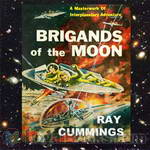 Brigands of the Moon
Brigands of the Moon
Gregg Haljan was aware that there was a certain danger in having the giant spaceship Planetara stop off at the moon to pick up Grantline’s special cargo of moon ore. For that rare metal — invaluable in keeping Earth’s technology running — was the target of many greedy eyes. But nevertheless he hadn’t figured on the special twist the clever Martian brigands would use. So when he found both the ship and himself suddenly in their hands, he knew that there was only one way in which he could hope to save that cargo and his own secret — that would be by turning space-pirate himself and paying the Brigands of the Moon back in their own interplanetary coin. (From the Gutenberg e-text) | |
By: Raymond Paton | |
|---|---|
 The Tale of Lal A Fantasy
The Tale of Lal A Fantasy
| |
By: Rebecca Sophia Clarke (1833-1906) | |
|---|---|
 Little Prudy
Little Prudy
I am going to tell you something about a little girl who was always saying and doing funny things, and very often getting into trouble. Her name was Prudy Parlin, and she and her sister Susy, three years older, lived in Portland, in the State of Maine, though every summer they went to Willowbrook, to visit their grandmother. (From chapter 1 ) | |
By: Reuben Bertram Oldfield (1878-) | |
|---|---|
 Exciting Adventures of Mister Robert Robin
Exciting Adventures of Mister Robert Robin
| |
By: Richard Archer | |
|---|---|
 The Island Home
The Island Home
| |
By: Richard Barnum | |
|---|---|
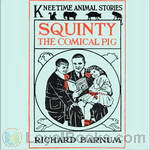 Squinty the Comical Pig
Squinty the Comical Pig
"This comical children's tale about the funny adventures of a funny pig written by an unknown author. The publisher has hired authors to write children's tales, and gave them "house names". The "name" of the author who wrote this tale is Richard Barnum. It became very successful, the most well known of Richard Barnum's tales. So, if you want to laugh a little, even if you are not a child, read this book". | |
By: Richard Harding Davis (1864-1916) | |
|---|---|
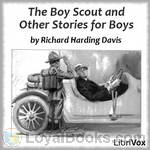 The Boy Scout and Other Stories for Boys
The Boy Scout and Other Stories for Boys
RICHARD HARDING DAVIS, as a friend and fellow author has written of him, was “youth incarnate,” and there is probably nothing that he wrote of which a boy would not some day come to feel the appeal. But there are certain of his stories that go with especial directness to a boy’s heart and sympathies and make for him quite unforgettable literature. A few of these were made some years ago into a volume, “Stories for Boys,” and found a large and enthusiastic special public in addition to Davis’s general readers; and the present collection from stories more recently published is issued with the same motive... | |
 The Boy Scout
The Boy Scout
| |
By: Richmal Crompton (1890-1969) | |
|---|---|
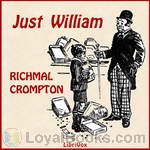 Just William
Just William
William is a mischievous eleven year old who is puzzled by the adult world, which is no less puzzled by him. The humor is gentle and pleasing. The series of books is better known in the United Kingdom than in the U.S. ( | |
By: Rita (E. M. Gollan) (1850-1938) | |
|---|---|
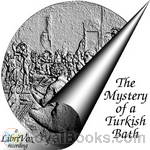 The Mystery of a Turkish Bath
The Mystery of a Turkish Bath
A group of guests, at an exclusive luxury hotel in Hampshire, are the witnesses of an illustration of occult powers, demonstrated by “the Mystery”, as Mrs. Jefferson named the beautiful stranger who one day appeared in the Turkish Baths of the hotel. The events that follow lead Mrs. Jefferson to question the wisdom of her interest in the occult. | |
By: Robert Louis Stevenson | |
|---|---|
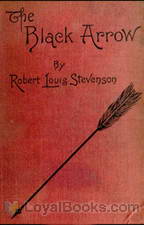 The Black Arrow; a Tale of Two Roses
The Black Arrow; a Tale of Two Roses
The Black Arrow tells the story of Richard (Dick) Shelton during the Wars of the Roses: how he becomes a knight, rescues his lady Joanna Sedley, and obtains justice for the murder of his father, Sir Harry Shelton. Outlaws in Tunstall Forest organized by Ellis Duckworth, whose weapon and calling card is a black arrow, cause Dick to suspect that his guardian Sir Daniel Brackley and his retainers are responsible for his father’s murder. Dick’s suspicions are enough to turn Sir Daniel against him, so he has no recourse but to escape from Sir Daniel and join the outlaws of the Black Arrow against him... | |
By: Robert Maitland | |
|---|---|
 The Boy Scout Automobilists or, Jack Danby in the Woods
The Boy Scout Automobilists or, Jack Danby in the Woods
| |
 The Boy Scout Fire Fighters or Jack Danby's Bravest Deed
The Boy Scout Fire Fighters or Jack Danby's Bravest Deed
| |
By: Robert Michael Ballantyne (1825-1894) | |
|---|---|
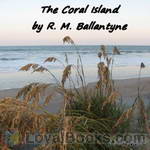 The Coral Island - A Tale of the Pacific Ocean
The Coral Island - A Tale of the Pacific Ocean
Ralph Rover is a traveler at heart, and has always dreamed of shipping out to the South Seas islands. He finally convinces his aging parents to let him go and find his way in the world. But the islands that Ralph finds are not as idyllic as in his dreams. Shipwrecked on a large, uninhabited island, Ralph and his fellow survivors, Jim and Peterkin, discover a world of hostile natives and villainous pirates. Danger, high adventure, and wonders of the sea greet them at every turn. When all seems lost, they find help from an unexpected source. | |
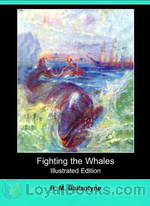 Fighting the Whales
Fighting the Whales
A fatherless boy joins the crew of a whaling ship in order to earn a living for himself and his mother. Beyond being a fascinating depiction of a now-alien time, occupation, and culture, it’s also a rousing adventure story. One is left with the impression that hunting and catching a whale in a sailing ship was akin to you or me being stalked, ambushed, and killed by a shoebox full of mice. | |
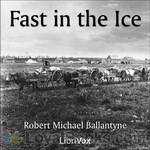 Fast in the Ice
Fast in the Ice
At the age of 16 Ballantyne went to Canada and was six years in the service of the Hudson’s Bay Company. His rule in writing, being in every case, was to write as far as possible from personal knowledge of the scenes he described. In this book he details the lives of the crew as they must overwinter in the frozen north including their meetings with Eskimos and bears and their struggles with disease. This is a realistic account of what life was like for the explorers of the Arctic. | |
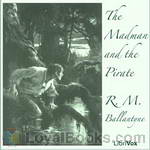 The Madman And The Pirate
The Madman And The Pirate
R. M. Ballantyne (April 24, 1825 – February 8, 1894) was a Scottish juvenile fiction writer. Born Robert Michael Ballantyne in Edinburgh, he was part of a famous family of printers and publishers. At the age of 16 he went to Canada and was six years in the service of the Hudson’s Bay Company. He returned to Scotland in 1847, and published his first book the following year, Hudson’s Bay: or, Life in the Wilds of North America. For some time he was employed by Messrs Constable, the publishers, but in 1856 he gave up business for the profession of literature, and began the series of adventure stories for the young with which his name is popularly associated. | |
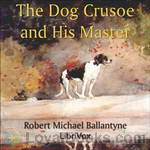 The Dog Crusoe and His Master
The Dog Crusoe and His Master
This is a story of an adventure involving a young man, his dog, and two friends. Together they wander through the Western prairies on a mission to make peace between the “pale-faces” and the “Red men”. They face many perils and become heroes many times over. This wonderful story takes the characters (and the reader) on an action-packed journey through the Western prairies during the times when relations between the white man and the Natives were not always peaceful. | |
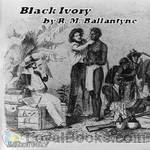 Black Ivory
Black Ivory
Although the book's title Black Ivory denotes dealing in the slave trade it is not our heroes who are doing it. At the very first chapter there is a shipwreck, which leaves the son of the charterer of the sinking ship, and a seaman friend of his, alone on the east coast of Africa, where Arab and Portuguese slave traders were still carrying out their evil trade, despite the great efforts of patrolling British warships to limit it and free the unfortunates whom they found being carried away in the Arab dhows... | |
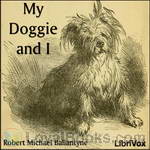 My Doggie and I
My Doggie and I
This story surrounds a child waif, a young woman, a young gentleman doctor, and an elderly lady. This tale unfolds the story of a bond that brings these unlikely friends together and merges their separate paths of life into one common path. The bond is "Dumps", or "Pompey", the "doggie". With many twists, turns, and uncertainties, the ending may surprise the reader. All's well that ends well in this doggie "tail". (Introduction by Allyson Hester) | |
 The Pirate City An Algerine Tale
The Pirate City An Algerine Tale
| |
 Gorilla Hunters
Gorilla Hunters
Ralph Rover is happily at home from his adventure on The Coral Island and wondering if he should settle down when he receives a visit from an eccentric stranger that won't give his name. This visit starts him on a string of adventures that find him getting charged by rhinoceroses, chased by African natives, and facing down a larger-than-life gorilla on his own. Of course, this is only the start of his adventure in to the land of the gorillas. Please note: this book has some words now considered derogatory, which are used in a generic way without any derogatory meaning... | |
 The Big Otter
The Big Otter
| |
 The Lifeboat
The Lifeboat
| |
 The Butterfly's Ball and the Grasshopper's Feast
The Butterfly's Ball and the Grasshopper's Feast
| |
 The Norsemen in the West
The Norsemen in the West
| |
 The Buffalo Runners A Tale of the Red River Plains
The Buffalo Runners A Tale of the Red River Plains
| |
 The Battery and the Boiler Adventures in Laying of Submarine Electric Cables
The Battery and the Boiler Adventures in Laying of Submarine Electric Cables
| |
 The Rover of the Andes A Tale of Adventure on South America
The Rover of the Andes A Tale of Adventure on South America
| |
 The Golden Dream Adventures in the Far West
The Golden Dream Adventures in the Far West
| |
 Iron Horse
Iron Horse
“Is that your bundle, sir?” repeated Mr Blunt a little louder. “Eh? yes, yes—all right,” replied Edwin, annoyed at the interruption, and thinking only of Emma Lee, to whom he turned, and went on—“Well, when Colonel Jones had scaled the first wall—” “Come, sir,” said Blunt, entering the carriage, and laying his hand on Edwin’s shoulder, “it’s not all right. This is another man’s property.” The youth turned round indignantly, and, with a flushed countenance, said, “What do you mean?” “I mean that you are travelling with another man’s property,” said Blunt, quietly pointing to the strapped rug... | |